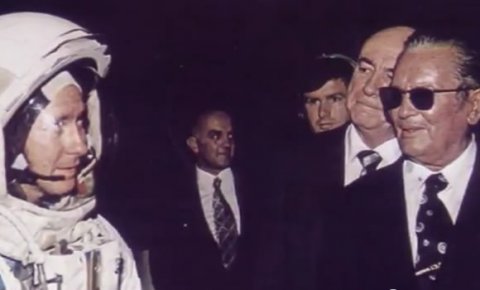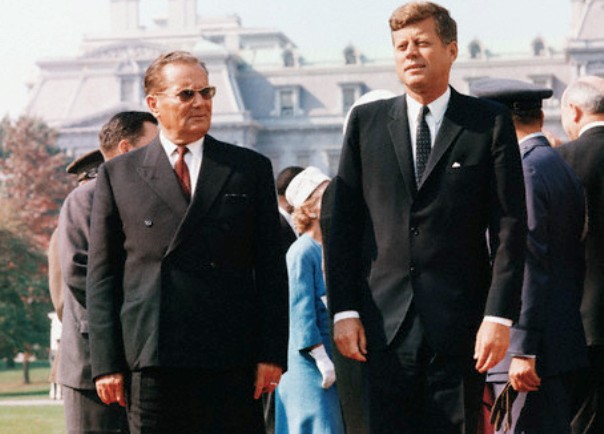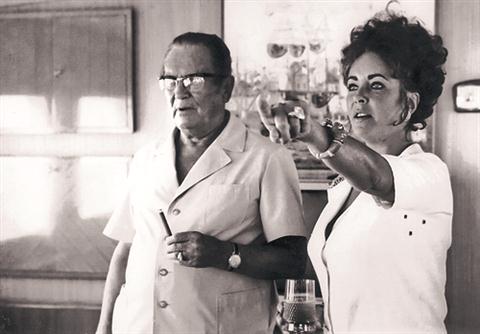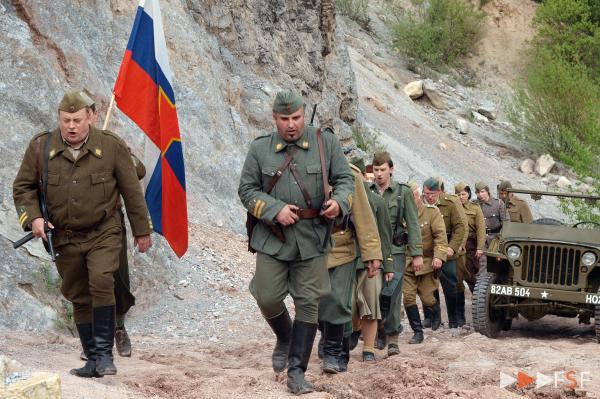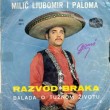Interview with Žiga Virc, creator of “Houston, We Have a Problem!” trailer for his alleged documentary on socialist Yugoslavia’s secret space program supposedly sold to the US in 1961
Posted on YouTube and picked up by numerous social network users, bloggers and even large media outlets, the video has gone viral in a matter of hours, currently with more than a quarter of a million views (and counting). Fascinated by what I had thought was Virc’s ingenious fake trailer for a fake documentary, I contacted him with a list of pre-written questions, some of them being rather surreal in nature. His answers may surprise you, though.
Has anyone from CIA contacted you yet?
CIA hasn’t contacted us yet.
Are you in possession of any secret documents or evidence that might jeopardize the United States or any other country? Have you considered collaborating with WikiLeaks?
As our project is still developing, we’re constantly receiving new information from various sources which we still need to confirm. At this stage of research we’re open for any sources that can help the story/film only. However, we are filmmakers and by this we are only interested in making a film that audience might find intriguing. We are not involved with politics as authors.
Did the Yugoslav space program have anything to do with the deaths in the Kennedy family? Was Marshal Tito personally responsible for the assassination of JFK?
This topic is not relevant for our film, therefore I do not have an answer to that.
Any chance Tito’s partisans were in possession of a space program during World War Two? Weren’t they in reality the ones responsible for Hitler’s death, striking him with a laser beam from the moon?
Again, this topic is not relevant for our film, therefore I do not have an answer to that.
Is this a trailer for a mystery documentary proper, a trailer for a wicked mockumentary, a promotional trailer for your yet undisclosed project, or a fake trailer to be understood in a similar vein as Robert Rodriguez and Quentin Tarantino’s Grindhouse trailers?
We call this project docudrama and we made a trailer, which consists of information we could gather so far. Docudrama means the film will be based on true events and archives, but we might not get the archives or evidence for some parts and we’ll have to do some dramatisation (as this is usual in documentaries about real crime scenes, for instance).
Right now we can say 90% of facts are confirmed – for instance Slovene Herman Potočnik – Noordung, whose book “The problem of space travel” was a basis for establishing the rocket programme in Nazi Germany and later in NASA. We just got a confirmation that photo of Herman Potočnik is still hanging in NASA headquarters. His work was a great inspiration for the Soviet, German and post-1945 USA space program.
The Yugoslav role in space research is definitely the most intriguing for us and there’s a lot of work to be done. SFR Yugoslavia had a lot of technical resources for war industry. The biggest underground complex was Željava, built as a base for supersonic jets and other high-tech technologies. There are other very interesting facts – for instance, Tito received a stone from the Moon from USA as a souvenir, etc.
Judging from your previous film projects I’d say you are using this genre to get a certain point across? Are you trying to criticize something in particular with regard to former Yugoslavia or is it a critical comment on present day issues?
As always, the basic idea behind my every project is to tell an interesting story that the audience might find interesting. If someone wants to get a certain point across or criticize politics, film might not be the best tool for that. After receiving a lot of positive feedback and contacts for collaboration, I’d say no one finds the story critical in a sensationalistic way.
Your YouTube trailer has gone viral but its claims have been reiterated by various news organizations. Was that your initial intention? What does that say about the state of news media today?
Our initial intention was to present our project that is still in a very early research phase. I have a lot of experience with viral videos but I can honestly say that the best way to make a viral video is not to think about it or plan it as viral. In the past, people tried to make a viral video just for the sake of many views – but usually it didn’t work out. If you’re sincerely telling your story, the audience will feel that.
What kind of secret information sources have you been using? Can you name some of historians and other experts that you collaborated with on this project?
I’d like to emphasise once again that the film is at an early stage of preproduction. Nevertheless, we decided to go public with it and test the audience reaction. So we’re really happy regarding the current feedback as we’re putting a lot of effort in this film. At this point it’s not really a question of what’s true or what’s fiction – the only relevant differentiation is what is confirmed and what is not (yet) confirmed.
Therefore we’re still looking for people that were in any way connected to our topic – Yugoslavian secret space programme, especially in the 1961 when main events were supposed to happen. As we’re in research phase I cannot confirm any of the people involved, since that could have negative influence on our work. We’re getting in touch with some people that are interested in helping us but at the same time do not want their names to be made public. Our production is very strict regarding this, but it’s all for a good cause.
What is your message to the people who believe your video is a trailer for a real documentary?
Right now approx. 90% of facts in our trailer are confirmed and widely available to check, which is probably a very high percentage of actual facts compared to today’s images shown on TV-news. Therefore, I’m sure audience will find it honest and believable.
Žiga Virc: from Trieste to NASA
One of the five international finalists of the Academy Awards for best student film in 2010, Žiga Virc is a young, talented movie director from Slovenia.
Mind you, by now he is surely accustomed to not only a small portion of fame but also to reproofs and denunciations. These are bound to appear when employing parody and ridicule techniques while re-presenting real persons and events on film as he does. And he does it with great success, obviously. He’s particularly good when it comes to short-film format, not least due to his extensive experience in producing corporate films through the Studio Virc family company.
Early on in his career, he upset some people, but made many more laugh, with his short spoof documentary on a former ultra-marathon swimmer turned ultra-marathon alpine climber, mocking the notorious behaviour of Martin Strel, the Guinness Record marathon swimmer. However, Virc caused a much bigger stir with his critically acclaimed Trieste is Ours short fiction film which almost won him the Student Oscar.
Situated on the Italian side of the border between Slovenia and Italy, Trieste holds a great historical significance for many Slovenians. A sizable minority of Slovenian speaking people have been living in this North Adriatic area for centuries. During World War II, Tito’s partisans had conquered the Nazi occupied Trieste and ruled it for two months in 1945 only to withdraw later, under the pressure from their Western allies. Yugoslavia gave up its official claims to this port town in a bilateral agreement from 1954, but the “Trieste is Ours” slogan has remained popular with numerous Slovenians to this day.
As expected, from today’s perspective, Virc’s somewhat ambiguous promotional material for Trieste is Ours led some people to believe he created a provocative political film, nothing less than a call to arms for Slovenians to reconquer Trieste. This film rubs fresh salt into the wounds by recalling the suffering that resulted from the horrible deeds of the Yugoslav dictator’s gangs, exclaimed the Italian Foreign Minister – before even seeing the movie in full. This of course, led to a heated media polemic on communist vs. fascist crimes. Publicity, therefore, guaranteed.
After the premiere, it became obvious that Trieste is Ours had no intention of being an “apology of communist massacres”, as one of the Italian politicians had stated a week before. On the contrary, it is a rather benign satire depicting an eccentric middle aged Tito-stalgic bloke living in contemporary Slovenia. The guy has been re-enacting a battle for Trieste in miniature with his friends for years and estranging his wife and daughter from himself, as well as infuriating the local police, in the process. Not a fascist in sight, nor Italians, let alone victims of the 2nd World War, just some goofies impersonating Nazis and Tito’s partisans while shooting fake guns. The story is light years away from any controversy, though the ending could be interpreted as a bit naive and rather distasteful.
In the aftermath, Virc calmly explained that he tried to find a unique perspective on historic events that does not necessary respect the actual facts. Not surprisingly, his role models list included Quentin Tarantino (Inglorious Bastards), Dani Levi (My Führer) and Roberto Benigni (Life is Beautiful).
For a person claiming his work has nothing to do with politics, Virc has been provoking a number of social and political responses. It seems his fascination with Marshal Tito, as well as his battle with, and for, historical facts continues. I, for one, can’t wait to see not only the Houston full-length movie, if it ever sees the light of day, but especially people’s reactions to the idea on which its story is based.

